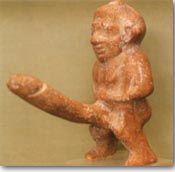![[Loyola University Chicago]](http://www.luc.edu/images/loyola.gif)
|
LATN 284: The Age of Augustus
LATN 345: Horace
Spring Semester 2010
|

|
Horace's first poetry-book opens up life-changing questions with innocent
abruptness, sophisticated irony, and consummate poetic refinement jitterbugging
inside a superficially rough shell. He called it Sermones, "chats," but
we know it as the book that decisively lifted Roman satire out of Lucilius's
garbage can to dance, flat-footed, on the rim. Horace's satires also project
ideal hopes for his own maturity, true friendship, and what Augustus's new world
could achieve for Roman life and letters.
Our work together will pursue three main aims (plus the fourth, of
having fun with them):
- Inquiring and studying, to gain knowledge of Horace's language, his literary, social,
historical, and cultural context, his poetical techniques, and the ideas he explored
in his Satires
- Analyzing and synthesizing, to build facility in reading Latin and appreciating
its communication
- Thinking critically, to investigate, generate, test, and advance theories about
how Sallust used Latin, poetic form, ethical reflection, and humor so as to interpret and even
to change Roman culture
T-Th 1:00pm-2:15pm
Information Commons 111
Dr. Jacqueline Long
Office Hours: TTh 8:45am-9:45am, Crown Center 579, or by appointment
phone: 773-508-3654
e-mail:
jlong1@luc.edu
Texts
- Required: Horace, Satires I, ed. Michael P. Brown, Aris & Phillips 1993
- Required: The Satires of Horace and Persius, tr. Niall Rudd, Penguin Classics, rev. ed. 2005
or another responsible translation of Horace's Satires Books I & II
- Recommended: J. H. Allen et al., Allen & Greenough's New Latin Grammar,
Dover Books 2006;
Allen
& Greenough On-Line is available thanks to the
Perseus Project
- Recommended: Charlton T. Lewis, ed., An Elementary Latin Dictionary,
Oxford University Press 1969 & rpt.; alternatively,
Lewis & Short
On-Line, is available from the Perseus Project
Policies and Assessment
Schedule of Reading Assignments and Topics
Internet resources
Horace and this course
- Substantive-hunt grid: model for some written homework.
- Verb-hunt grid: model for some written homework.
- Text of Horace,
Sermones I on-line from The Latin Library.
It doesn't include commentary, so it's no substitute for the required text, but it's a resource
when you need a quick look at the Latin.
- Biography with
Bibliography of Horace on-line from Diotima
(resources especially for the study of women and gender in the ancient
world).
- Ancient but pretty certainly non-Suetonian Life
of Horace, 1913 Loeb Classical Library available on-line through Paul Halsall's
People with a History
- To Sally, translation of
Horace, Odes 1.22 by John Quincy Adams, from the Poetry
Archive (which has translations of some other
Odes by other distinguished, if somewhat less surprising, post-antique English writers, too)
- The Horace's Villa Project of
the American Academy in Rome and the
Soprintendenza per i beni archeologici
del Lazio.
Latin in general
- Allen
& Greenough (also a recommended text, in print) is a good reference grammar on-line.
Consult its sections on forms and syntax as
often as the mood strikes you - they're always worth knowing. Scroll down
the Table of Contents to which this link takes you, and click on the link for each
item you wish to consult. Part of the Perseus Project.
- Lewis & Short On-Line
offers look-up access to a detailed reference dictionary.
Type in the character string for which you wish to search (preferably,
the dictionary-entry form of the word you want) and "submit query".
Warning! This page was initially set up
for people working with Greek, so many of its directions and responses
will come to you in terms of Greek words and transliterations. Do not
be alarmed! Your instructor will endeavor to help unsnarl any
confusions: just ask. Another helpful part of the
Perseus Project.
- Nuntii Latini offers current news briefs
in Latin. Produced by YLE Radio 1, the Finnish Broadcasting Company.
- latin.wunderground.com offers weather reports
in Latin. Produced by The Weather Underground, Inc..
Rome and Augustus
- AUGUSTUS (31 B.C. - 14 A.D.):
a good overview of Augustus and his reign by Garrett Fagan of Pennsylvania State
University. Part of De Imperatoribus Romanis,
the on-line encyclopedia of Roman emperors.
- Lacus Curtius:
a treasurehouse of on-line resources for just about everything conceivably relating to Roman
archaeology, compiled by Bill Thayer. For our purposes, provided that you give due attention
to all Thayer's caveats -research has much advanced since 1929 when this work was
originally published- Samuel Ball Platner's
Topographical
Dictionary of Ancient Rome is a convenient starting-point for exploration.
- Perseus Project:
an evolving digital library for the study of the Greek and Roman worlds.
- Vedute di Roma:
a collection of beautiful photographs of Rome and Roman antiquities by
Kalervo Koskimies of the Sibelius Academy.

Revised 29 December 2009 by
jlong1@luc.edu
http://www.luc.edu/classicalstudies/
![[Loyola University Chicago]](http://www.luc.edu/images/loyola.gif)

![[Loyola University Chicago]](http://www.luc.edu/images/loyola.gif)

